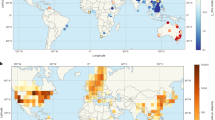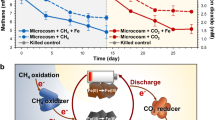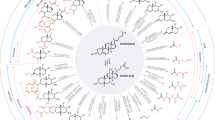Abstract
MERCURY is transformed by the microorganisms present in aquatic sediments1 and rat intestines2. Examples of some of the important reactions are illustrated below.
This is a preview of subscription content, access via your institution
Access options
Subscribe to this journal
Receive 51 print issues and online access
$199.00 per year
only $3.90 per issue
Buy this article
- Purchase on Springer Link
- Instant access to full article PDF
Prices may be subject to local taxes which are calculated during checkout
Similar content being viewed by others
References
Jensen, S., and Jernelöv, A., Nature, 223, 753–754 (1969).
Abdullah, M., Arnesjö, B., and Ihse, I., Svenska Läkartidingen, 71, 810–811 (1974).
Norseth, T., and Clarkson, T. W., Archs Environ. Health, 22, 568–577 (1968).
Bryant, M. P., and Robinson, I. M., J. Dairy Sci., 44, 1446–1456 (1961).
Hungate, R. E., Bact. Rev., 14, 1–49 (1950).
Westöö, G., Acta Chem. scand., 22, 2277–2280 (1968).
Wood, J. M., Kennedy, F. S., and Rosen, C. G., Nature, 220, 173 (1968).
Author information
Authors and Affiliations
Rights and permissions
About this article
Cite this article
EDWARDS, T., MCBRIDE, B. Biosynthesis and degradation of methylmercury in human faeces. Nature 253, 462–464 (1975). https://doi.org/10.1038/253462a0
Received:
Issue Date:
DOI: https://doi.org/10.1038/253462a0
This article is cited by
-
Intestinal microbiota protects against methylmercury-induced neurotoxicity
BioMetals (2023)
-
In vitro Methylation and demethylation of mercury compounds by the intestinal contents
Bulletin of Environmental Contamination and Toxicology (1990)
-
Studies on the role of gastrointestinal tract contents in the methylation of inorganic mercury compounds
Bulletin of Environmental Contamination and Toxicology (1989)
-
Anaerobic microbial methylation of inorganic tin in estuarine sediment slurries
Microbial Ecology (1987)
-
Biological methylation of inorganic mercury by Saccharomyces cerevisiae — A possible environmental process?
Fresenius' Zeitschrift für analytische Chemie (1983)
Comments
By submitting a comment you agree to abide by our Terms and Community Guidelines. If you find something abusive or that does not comply with our terms or guidelines please flag it as inappropriate.



